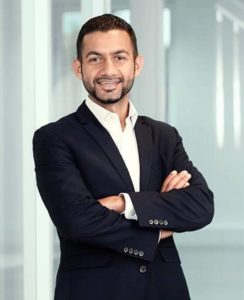Namir Hassan
BioLeader Interview – Namir Hassan (July 2020)

CEO of Zelluna Immunotherapy, a Norwegian biotech with a vision to save life through innovative cancer targeting cell therapies. I am forty-one, living in London and married to my quiet strength, Aseel; a father of three young energetic boys and deeply passionate about parenting. A degree from UCL and PhD in T Cell Immunology from Oxford University. Inspired by lifting others and I find energy from intense calisthenic workouts, learning and reflecting.
Key milestones in your career journey to date?
As Steve Jobs puts it: “you can’t connect the dots looking forward; you can only connect them looking backwards.” When I talk about my career, I usually describe it in three segments: learning about the immune system, learning how to discover and develop therapies, then closing the circle by using the immune system as a therapeutic treatment. As I look back now, the key milestones and (connected dots) for me have been:
- Completing a PhD in T cell immunology, as this was the start of my deep training in understanding the role of the immune system to fight diseases.
- Spending the first part of my career at GSK, as this served to train me in the process of drug discovery and development as well as operating with complex multidisciplinary projects.
- Working at Immunocore, which provided enormously enriching experience and returned me to using T cells as highly potent therapeutics. I believe this was a truly unique and highly privileged period in my career having leadership exposure from discovery through to clinical translation, in addition to organisational growth and development.
- Assuming the role of CEO at Zelluna is my most recent milestone; a vibrant small organisation with lofty ambition and driven by intriguing science. This role converges all my past (ideas, people and organisational) experiences, together.
Who has had the greatest influence over your career?
- My late father who recently passed and battled cancer with awe-inspiring courage and strength; he was my wisest counsel and my strongest ally. I miss him dearly.
- Bent Jakobsen, a compassionate human being with exquisite dialectical skill and a scientific visionary. Bent hired me to Immunocore, has shown me unwavering support and belief, and has been a dear friend and mentor ever since; Bent sits on the Zelluna Board.
Your approach to spotting and developing top talent?
- Follow my intuition and seeking signs of diminished ego, service to others, flexibility, aptitude, engagement, self-motivation and excellence. I create a role for those people, even if there isn’t one!
- I try to create space for talented people to step in to, and guide their growth through active listening, questioning and unrelenting support.
What attributes make an outstanding leader in today’s world?
- Leadership is about creating space for people, not consuming it; it’s about serving and lifting those around you; it’s empathy, compassion as well as courage and strength. It is diminished ego.
- It is about creating psychological safety so people feel they are in a trusting environment and can be vulnerable, ask questions, challenge and be themselves; it is about seeing what others don’t, and creating a vision that inspires and galvanises people towards it; it is about being mindful of the human element and unlocking human potential. It is about creating more leaders.
What is our industry’s contribution to improving climate change?
- In May, the highest ever carbon dioxide levels were recorded in the atmosphere so clearly, as a species, we need to do more; climate change is the most pressing challenge for our race.
- Covid-19 thrust all of us into new ways of working and re-inventing how we organise and co-operate. Reducing our footprint through less travel is one dimension to improving climate change and Zelluna embraces this. The truly disruptive interventions though, will come from pervasively embedding cleaner practices and innovations in waste removal and recycling.
How do you create a culture of continual learning, innovation and curiosity?
I follow three guiding principles:
- Purpose: to be very clear about the “why”; to present an inspiring purpose for the organisation and rally people around it. To remind ourselves constantly for our reason for being.
- Self-Management: to encourage distributed leadership, decision making and the view that “failure” is a learning opportunity.
- Wholeness: to have people at the centre; to foster a culture of trust, vulnerability, transparency and togetherness. To remove any facades and be guided by strong values.
What’s your hidden talent or something that might surprise others about you?
I sometimes write poems and can solve the Rubik’s cube!
Thoughts on the current funding model for early stage companies?
Capital does exist for the life-sciences sector and the cadence of funding, overall, can work well. One of the challenges for very early technology companies is the difficulty for funding bodies to meaningfully assess the prospect and risk, particularly for highly innovative projects. This leads to risk aversion and missed opportunities. I would like to see more relevant experts gathered to enable a balanced assessment of early stage companies and, also, higher quality oversight by experts for those companies through the early, yet very formative milestones.
What will be the biggest technological transformation in the industry over the next 5 years?
Allogeneic “off the shelf” cell therapies will break further ground and produce life-changing products for patients.
Your views on encouraging volunteering amongst colleagues?
It is a cliché, but time is the most precious commodity and giving time to those in need is a responsibility on us all. The hidden gem of serving others and giving time is that it induces an enduring sense of fulfilment in individuals and creates stronger connections between volunteering groups. I encourage service, giving time and reaching out.
Your legacy to the sector?
It seems a little premature to discuss legacies, but if I were to highlight some areas where I hope I have made an impact they would be:
- Steering Immunocore’s growth at a critical phase for the company and leading the first-in-class bispecific molecule through early clinical development for the benefit of late stage melanoma patients.
- Building a pipeline and business unit for the deployment of the Immunocore platform to infectious diseases.
- Perhaps, most importantly, I hope through mentorship and guidance, that I have been a positive influence on people in the sector, and inspired them to great achievements as well as becoming scientific leaders themselves.
Your simple philosophy on life?
Borrowing from one of my favourite philosophers Lao Tzu: When no credit is taken accomplishment endures.
Words of wisdom?
- Best advice I was given: Activity is not always progress; in the frenetic world we find ourselves, we can sometimes get caught up in “busyness” and convince ourselves that being busy means we are making progress, but, many times, it doesn’t.
- Advice I would give: Plan but not too much; your passions, motivations and interests evolve over time so sense and respond to these.
- What I wish I’d known: To trust the journey; it sometimes requires you to look back to understand the wisdom behind the path you’ve trodden.
Click here to read more of our BioLeaders interviews.

